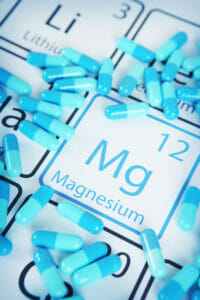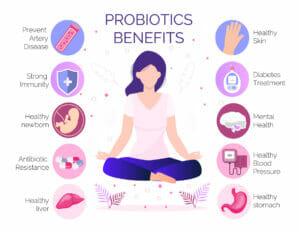Can You Use Supplements to Lower Your Blood Pressure?

Having high blood pressure puts a person at risk of serious health risks, including heart attacks and stroke. There are many ways to lower your blood pressure. Any doctor will tell you to quit smoking (if you smoke), exercise regularly, and reduce your alcohol intake—they may also recommend medication and lifestyle changes, including dietary changes, which may leave you wondering if there are supplements to lower blood pressure.
While there is no substitute for the advice of your doctor, if you are looking for ways to reduce your risk of high blood pressure, even before you have it, the following vitamins and minerals may have an effect.
Table of Contents
Magnesium

While there have been many studies to try and prove that magnesium supplementation lowers blood pressure, and some that have shown a link, many of the trials are short in duration or have other limitations.
A large meta analysis of 34 studies, involving a total of over two thousand participants across a variety of backgrounds concluded that supplementation with magnesium did lower both systolic and diastolic blood pressure even in adults with normal blood pressure at the beginnings of the trials (2). The authors noted what they called a “casual blood pressure lowering effect” while also calling for more rigorous, longer term studies to truly determine an effect. The average dosage within the trials reviewed was 300mg over a period of one month and a normal recommended daily allowance of magnesium is between 310-420mg.
Vitamin D
Researchers have noticed that there seems to be a link between low vitamin D levels in the blood and higher than normal blood pressure. Saying both that vitamin D appears to modulate blood pressure indirectly and that there needs to be further high quality investigations to prove a link, the authors concluded by saying “We suggest that physicians should keep a check on the Vitamin D levels of their patients in order to curb the ever-increasing incidence of hypertension.” (3)
Potassium
It’s almost impossible to talk about blood pressure without mentioning potassium. Potassium is an electrolyte that helps eliminate excess sodium from the body. Higher sodium intake has been linked to high blood pressure so it seems logical that higher potassium intake helps the body excrete more sodium and helps lower blood pressure but scientists have found its not that simple. While there have been numerous studies noting a lowering effect on blood pressure with potassium supplementation, including a 2017 meta-analysis of the evidence, it is often noted that the RDA of 90mcg is sufficient. (4) An excess of potassium has risks, especially for those with kidney disorders, and the American Heart Association recommends a diet both low in sodium and sufficient in potassium for all adults.
Coenzyme Q-10

Folic Acid
While some studies have found supplementation of folic acid (folate) lowers blood pressure in those without any preexisting conditions, most of the studies are done in competition with blood pressure medication, which always outperforms it. (6) It has been well established that supplementation with folic acid doesn’t reduce the likelihood of cardiovascular events even if it does lower blood pressure.
A twenty year long study did find a casual link between higher folate intake in young adults and the risk of higher than normal blood pressure later in life (7) but as with most studies regarding supplements to lower blood pressure, the authors noted further studies needed to be conducted.
L-Arginine
A semi-essential amino acid, L-arginine is responsible for smooth muscle relaxation and has a function in regulating blood pressure. Due to the known link between L-arginine and the cardiovascular system, many studies have tried to prove a link between using a l-Arginine supplement and lower blood pressure, with varying conclusions. A meta analysis of the available studies found that in general, L-Arginine did have an effect of lowering both systolic and diastolic blood pressure but caution that interpretations should be done lightly, as a majority of the studies were conducted in pregnant women with above average blood pressure. (8) The limitations of the studies means that no solid conclusions can be drawn.
Probiotics

Garlic
Garlic may improve general cardiovascular health. Studied for its ability to reduce artery stiffness, Kyolic aged garlic was found to have an effect on blood pressure and improve gut microflora, a finding which may also support the role of a healthy gut in overall health. (10)
The evidence linking supplements and lower blood pressure is generally inconsistent or in some cases controversial. Potassium may have an effect, as may magnesium and probiotics, but following a healthy diet and reducing sodium intake are surefire, doctor recommended paths to the healthiest body possible.
Thank you for taking the time to read Can You Use Supplements to Lower Your Blood Pressure?
Please note: All information presented to you in this website is intended for your general knowledge only and is not a substitute for medical advice or treatment for specific medical conditions. We cannot, and will not give you medical advice. We strongly recommend you consult your physician for any and all specific health issues. If you have any questions or contributions, please contact us via email or phone-call. We are constantly looking for new information to promote wellness – and hearing from you would make our day.
Live Vibrantly!
References
1) Magnesium for the prevention and treatment of cardiovascular disease
2) Magnesium for the prevention and treatment of cardiovascular disease
3) Does Vitamin D Deficiency Lead to Hypertension?
7) Folate intake and incidence of hypertension among American young adults: a 20-y follow-up study
8) Therapeutic Benefits of l-Arginine: An Umbrella Review of Meta-analyses







